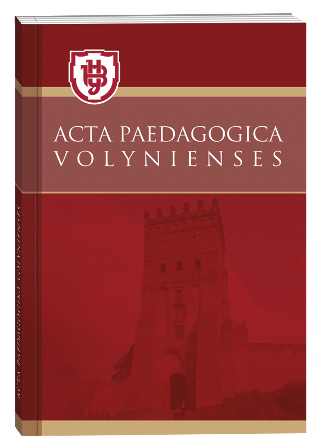FEATURES AND POTENTIALS OF NON-FORMAL ADULT EDUCATION IN UKRAINIAN EDUCATIONAL ENVIRONMENT
DOI:
https://doi.org/10.32782/apv/2024.1.14Keywords:
adult learner, andragogical staff, adult education, non-formal adult education, lifelong learning, lifelong professional development.Abstract
The aim of the article ii to define features and potentials of non-formal adult education in Ukrainian educational environment that is focused on adult learners` development and motivation; effective change management; the challenge of real life adult learners can face; ability to prove adult learners can use knowledge to introduce themselves professionally and communicate effectively in everyday situations and work. General scientific methods such as analysis, synthesis and generalization of the scientific information on different theoretical approaches to the problem of non-formal adult education have been used. One of the most important tasks at the present stage of modernizing non-formal adult education in national teaching and learning process is to ensure teaching quality according to both national and international requirements as well as support adult learners in delivering successful learning preparing them for future challenges. This issue is partly a reaction to the rapid changes in technologies adult learners can see around and experience on a daily basis. Information technologies, effective tools and timely forehanded receiving of information are becoming essential and crucial factors in the teaching lifelong education process. There is a need to bring into focus the non-formal adult education process to improve the design and structure of adult learning opportunities. In this article, we address concepts and approaches, which are equipped with appropriate innovative-based effective tools in accordance with the latest requirements identifying key issues that emerge in non-formal adult education, introducing them as substantial elements of teachers’ professional competence and their effective use in lifelong education process. Particular attention is paid to the teacher`s role and significance in nonformal adult education making such a process more meaningful for adult learners.
References
Аніщенко О. Концепція розвитку неформальної освіти дорослих в україні. Освіта дорослих: теорія, досвід, перспективи. 2019. № 1(15), С. 20-39. https://doi.org/10.35387/od.1(15).2019.20-39
Лук’янова, Л.Б., Аніщенко, О.В., Москаленко, А.М. Концепція розвитку освіти дорослих в Україні. Проєкт (рукопис). ГС «Українська асоціація освіти дорослих». К. 2019. 35 с. URL: http://www.uaod.org.ua/
Москаленко Л. Неформальна освіта в Україні: вимірювання можливостей (за результатами соціологічного дослідження). Вісник Львівського університету. Серія соціологічна. 2018. № 12, С. 180-187.
Рассказова О. Л. Неформальна освіта дорослих: виклики і суперечності. Освіта дорослих: теорія, досвід, перспективи. Ніжин: 2017. № 1 (13). С. 64–73.
Самодумська О. Підготовка науково-педагогічних працівників до діяльності у неформальній освіті дорослих: реалії та перспективи. Вісник Житомирського державного університету імені Івана Франка. Педагогічні науки . 2018. № 4 (95). С. 166–175.
Самодумська О.Сучасна неформальна освіта дорослих в Україні Teória a prax edukácie dospelých:Andragogickė vedeckė študie. Prešov, 2019. С. 83–89.
Самодумська О., Зарішняк І., Тарасенко Г., Бучацька С., Будас І., Трегубенко І. Гейміфікація в неформальних освітніх практиках для дорослих. Revista Romaneasca Pentru Educatie Multidimensionala , 2022. . №14 (2), С. 156-176. https://doi.org/10.18662/rrem/14.2/573
Ajani O.A. Teachers’ perspectives on professional development: towards an andragogical approach. J. Educ. Soc. Res. 2021. Vol.11 no 3. P. 288–300.
Abela J. Adult learning theories and medical education: A review. Malta Medical Journal. 2009. Vol. 21 no 1. P. 11-17.
Antikainen A., Kauppila J. Educational generations and the futures of adult education: a Nordic experience. International Journal of Lifelong Education, 2002. Vol. 21 no 3. P. 209-219.
Barkley E. Student Engagement Techniques: A Handbook for College Faculty. San Francisco, CA: Jossey-Bass. 2009. 432 p.
Finnish National Board of Education (FNBE) Learning and competence 2020 – Strategy of the Finnish National Board of Education. Helsinki, Finnish National Board of Education. 2011. http://www.oph.fi
Hamlin M.D. Building and Maintaining Adult Learning Advantage. IGI Global; Creating an Andragogy for Adult Learning Advantage; 2020. P. 209–231.
Henschke J.A. Modeling the Preparation of Adult Educators. Adult Learning, 1998. Vol. 9 no 3. P. 11–14.
Huggins C. M., Stamatel J.P. An exploratory study comparing the effectiveness of lecturing versus team-based learning. Teaching Sociology, 2015. Vol.43 no 3. P. 227-235.
Illeris K. Adult Education and Adult Learning. Malabar: Krieger. 2004. 245 p.
Knowles M.S., Holton E.F., & Swanson R.A. The adult learner: The definitive classic in adult education and human resource development. 7th ed. Routledge: New York. 2012. 378 p,
Kuosmanen R. Liberal Adult Education: Finnish Approach. Lifelong Education: continuing education for sustainable development, 2014. Vol. 2, P. 131.
Lindeman E. The meaning of adult education. Montreal: Harvest House. 1961. 222 p.
Livingston N., Cummings-Clay D. Advancing adult learning using andragogic instructional practices. International Journal of Multidisciplinary Perspectives in Higher Education, 2023. Vol. 8 no1. P. 29-53, ISSN: 2474-2546 Print/ ISSN: 2474-2554, https://ojed.org/jimphe
Martin,F., Bolliger D. Engagement Matters: Student Perceptions on the Importance of Engagement Strategies in the Online Learning Environment. Online Learning Journal, 2018. Vol. 22 no 1. P. 205-222.
McCall R. C., Padron K., & Andrews C. Evidence-Based Instructional Strategies for Adult Learners: A Review of the Literature. City University of New York Academic Works, 2018. Vol. 4 no 4. P. 29- 47. https://academicworks.cuny.edu/bx_pubs/43
Milana M., Nesbit T. (eds.) Global Perspectives on Adult Education and Learning Policy. Basingstoke, New York: Palgrave Macmillan, 2015. 253 p.
Milana M. & Tarozzi M. Rethinking adult learning and education as global citizenship education: A conceptual model with implications for policy, practice and further research. International Journal of Development Education and Global Learning, 2021. Vol. 13 no1. P. 46–60. doi: https://doi.org/10.14324/IJDEGL.13.1.04
Niemi H., Jakku-Sihvonen R. Research-based teacher education in Finland. Reflections by Finnish teacher educators. Turku: Finnish Educational Research Association. 2006. P. 31–50.
OECD Skills Outlook 2013: First Results from the Survey of Adult Skills (PIAAC, 2013), http://www.oecdilibrary.org
Ogienko O., Meleshko I. Andragogical approach to adult learning: experience of Finland. In Kucha R., Cudak H. (eds.). Discourses on Culture. Łódź. – Warszawa: Społeczna Academia Nauk: Studia i Monografie, 2017. P. 273-284
Ogienko1 O., Terenko O. Non-Formal Adult Education: Challenges and Prospectsof 21st Century. Edukacja – Technika – Informatyka. 2018. Vol. 2 no 24, P. 169-174 www.eti.rzeszow.pl DOI: 10.15584/eti. 2018.2.22
Stern C., Kaur, T. Developing theory-based, practical information literacy training for adults. International Information and Library Review, 2010. Vol.42 no 2, P. 69-74. https://doi.org/10.1016/j.iilr.2010.04.011







